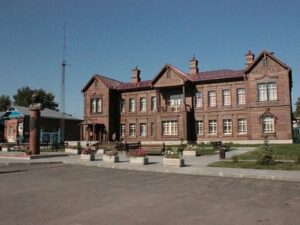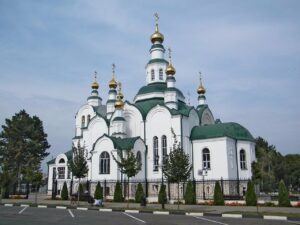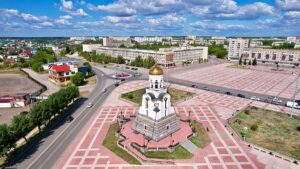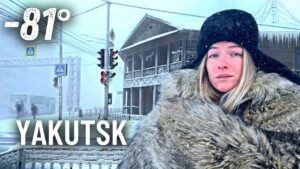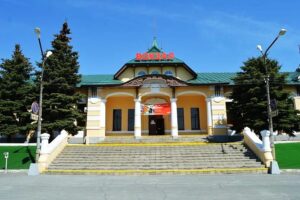Penza: Cultural Crossroads in the Heart of Russia

Penza: Cultural Crossroads in the Heart of Russia
Penza, a city situated in the western part of Russia, serves as the administrative center of Penza Oblast. Known for its rich cultural heritage, historical landmarks, and scenic landscapes, Penza has evolved from a provincial outpost into a vibrant urban center that blends traditional Russian charm with modern amenities and cultural diversity.
Geography and Climate
Penza is located in the European part of Russia, approximately 625 kilometers southeast of Moscow, on the banks of the Sura River. The city is surrounded by fertile plains and agricultural lands, with the Sura River meandering through its picturesque landscape. Penza experiences a temperate continental climate, characterized by cold winters and warm summers, influenced by its inland location.
History and Cultural Heritage
Penza’s history dates back to the late 17th century when it was founded as a fortress and trading outpost on the southeastern frontier of the Russian Empire. The city played a significant role in defending Russia’s borders and facilitating trade with neighboring regions. Throughout its history, Penza has witnessed periods of prosperity and cultural flourishing, marked by the construction of churches, monasteries, and civic buildings that reflect its architectural heritage.
The city’s cultural life is enriched by theaters, museums, and art galleries showcasing local talent and historical artifacts. The Penza Regional Museum of Local Lore preserves exhibits related to the region’s archaeology, ethnography, and history, offering insights into Penza’s past and its cultural evolution.
Cultural Diversity and Community Life
Penza is home to a diverse population, including Russians, Tatars, Chuvash, and other ethnic groups, reflecting its role as a cultural crossroads in central Russia. The city’s cultural diversity is celebrated through festivals, exhibitions, and performances that highlight traditional music, dance, and cuisine. Annual events such as the Penza City Day and the Penza Theater Festival attract residents and visitors alike, fostering community spirit and cultural exchange.
Landmarks and Attractions
Penza boasts several architectural landmarks and cultural attractions that showcase its historical and artistic significance. The Penza Kremlin, a fortified complex dating back to the 17th century, is a focal point of the city’s historical district, featuring churches, museums, and administrative buildings. The Cathedral of the Transfiguration of the Savior, with its distinctive onion domes and ornate interior, is a masterpiece of Russian Orthodox architecture and a place of spiritual reverence.
The Sura River embankment provides a scenic setting for leisure activities, with parks, promenades, and recreational facilities offering opportunities for relaxation and outdoor pursuits. Nearby, the Penza Zoo and Botanical Garden provide educational and recreational experiences, showcasing diverse plant and animal species while promoting environmental conservation.
Economic Hub
Penza serves as an economic and industrial hub in the region, with manufacturing, agriculture, and services driving its economy. The city’s industries produce machinery, textiles, food products, and consumer goods, contributing to regional economic growth and employment. Penza’s strategic location on major transportation routes, including railways and highways, facilitates the transportation of goods to domestic and international markets, supporting trade and commerce.
Education and Innovation
Penza is home to several educational institutions, including Penza State University and branches of leading Russian universities, fostering academic research, innovation, and skills development. These institutions collaborate with local industries to promote technological advancement and entrepreneurship, supporting the city’s transition to a knowledge-based economy.
Urban Development and Sustainability
In recent years, Penza has undergone urban development projects aimed at improving infrastructure, enhancing quality of life, and promoting environmental sustainability. Efforts to modernize housing, transport, and public amenities have transformed the cityscape, while initiatives focusing on environmental protection, energy efficiency, and waste management aim to create a sustainable and resilient urban environment for future generations.
Challenges and Future Prospects
Penza faces challenges such as urbanization, environmental sustainability, and socio-economic disparities, which require coordinated efforts from government, industry, and civil society to address. Initiatives focusing on sustainable development, social welfare, and community engagement aim to create inclusive growth and improve the well-being of all residents.
Conclusion
Penza, with its historical legacy, cultural diversity, and economic vitality, stands as a dynamic city in central Russia. From its origins as a frontier fortress to its role as a center of culture, commerce, and community life, Penza continues to evolve while preserving its traditions and embracing modernity. As it navigates the challenges and opportunities of the 21st century, Penza remains a symbol of resilience, creativity, and progress in Russia’s diverse and dynamic urban landscape.
